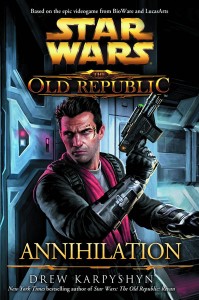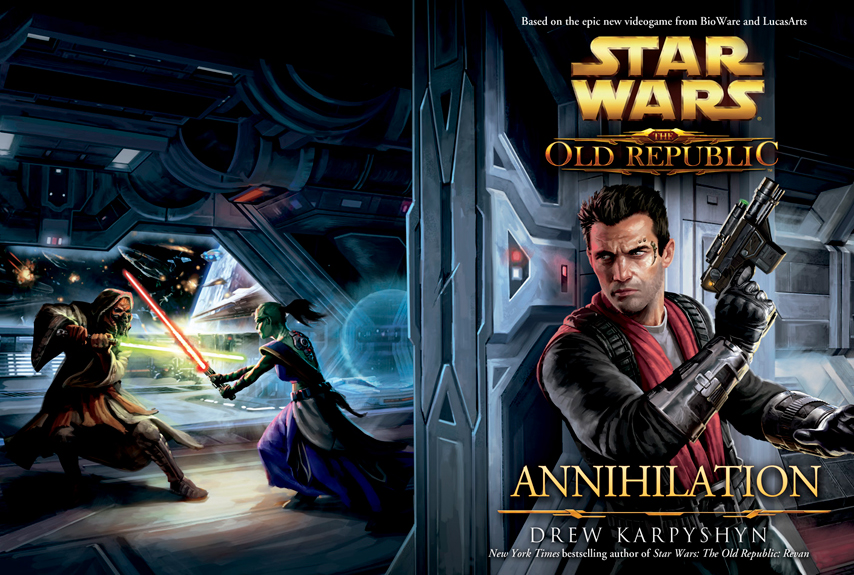It’s taken slightly longer than anticipated thanks to some difficulties with the library but I’ve finally finished the first leg of my Expanded Universe reread. The short version? There were certainly some ups and downs and WOW am I glad to be getting out of these eras and away from these old school Sith. (Sith Fatigue is a real and dangerous disease, folks. It claims hundreds of readers every year.)
The Old Republic: Revan:
I’ll freely admit to being a HUGE KOTOR fangirl back in the day. Somewhere, buried on a harddrive, is probably a lot of half-written fanfic about the characters. I was obsessed with Revan and had slightly ridiculous crushes on both Carth Onasi and Atton Rand. (That was totally my right as a 14 year old girl.) If you’ve never played either of the Knights of the Old Republic games, the one thing you should know is that your character (Revan in the first game and the Exile in the second) is essentially a blank slate. You decide their gender, their looks, and their personality. Therefore, I spent most of the first half of the book trying to reconcile the Revan in my head (a very snarky lady) with the canon Revan who is decidedly not her and is, in fact, a man. (Curse you, canon!) Also, I insist that Natalya Donn is totally a better name for the Exile than Meetra Surik. I mean…. Meetra? Really?
As a whole, the book left me feeling mostly underwhelmed. The basic premise? Great. I’ve always been intrigued about what made Revan originally turn to the dark side and where he disappeared to in the time between games. I wasn’t as thrilled with the execution. For starters, the book falls just short of 300 pages; something that makes me glad I didn’t purchase this book as a hardcover. I also felt that the many of the action sequences fell victim to video game syndrome where paragraphs often felt like they were queues of action commands. Additionally, I found myself missing the presence of characters like HK-47 and Jolee although I can understand why they were left out of the book.
My biggest issue was with the pacing. Obviously Karpyshyn was aiming to answer some of the questions players had about the gap between games which, as one of those players, I appreciated. However, the ending felt rushed, weirdly open ended and I still don’t really know what happened. (I’m also a bit miffed about the Exile’s unceremonious exit but that’s another rant entirely.) Two-thirds of the book occurs in the gap between games and the last third post-KOTOR2. It certainly could have benefited from a more even split and more pages. Actually, upon further reflection, I’m comfortable with saying that I hated the ending.
This all isn’t to say that the book is horrible but it won’t be making my ‘Essential EU Reads’ list any time soon. It’s certainly worth the read if you were a KOTOR player and if your Revan was male, you’ll probably have a much easier time getting into the book than I did. I did enjoy the parts with Canderous (even wished there had been more of them) and I especially appreciated the nods to the Mando language.
At the end of the day, it’s not a replacement for KOTOR3 (honestly, nothing really could be) but at the very least, it’ll help fill the KOTOR shaped void in your life for a little bit.



